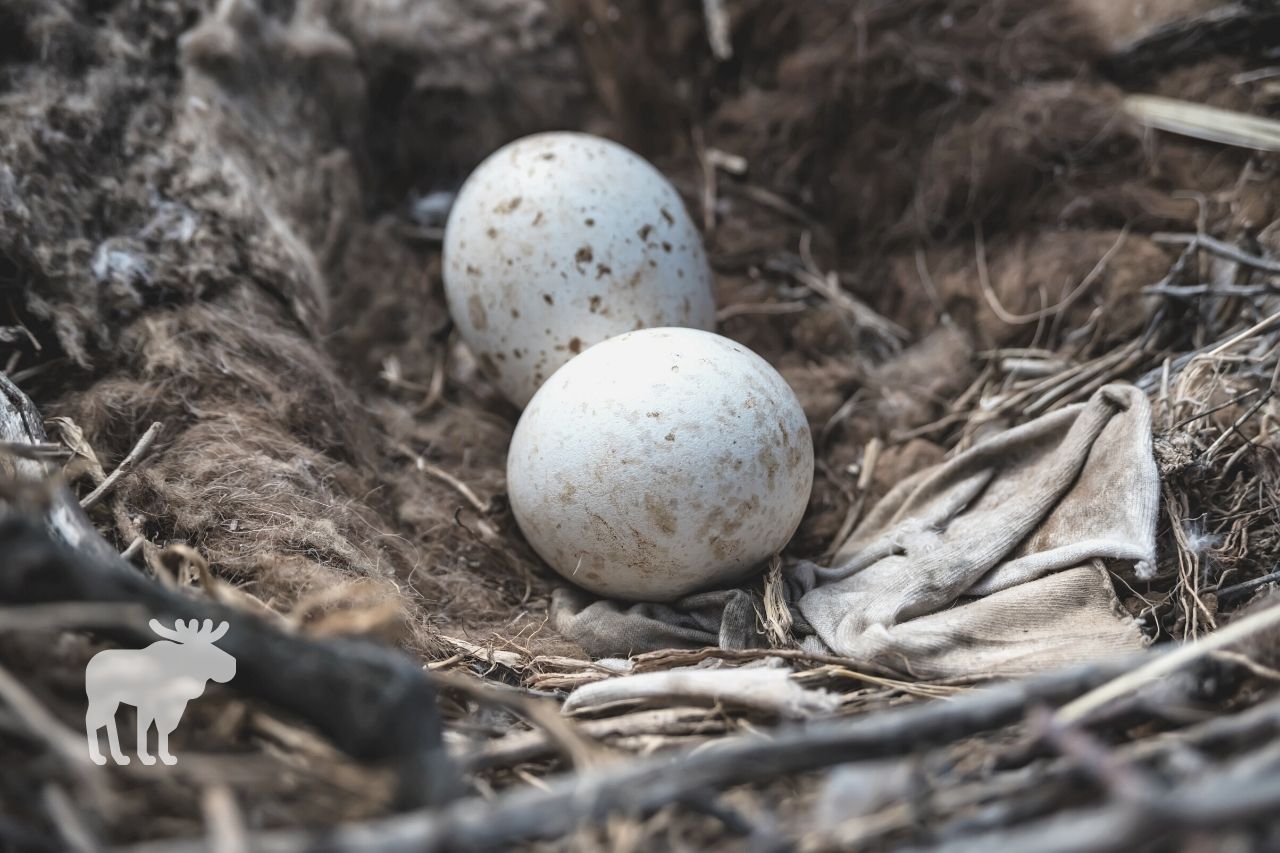Have you ever watched a live eagle cam? You may have seen parent eagles caring for newly hatched young while one or more eggs in the nest remain unhatched. Is this normal? What do eagles do with eggs that don’t hatch? How long will they continue to incubate eggs before realizing they aren’t going to hatch?
Keep reading! In this article, we’ll answer all of these questions about this majestic apex predator and more.
What You'll Learn Today
How Many Eggs Do Bald Eagles Lay?

According to the National Eagle Center, bald eagles usually lay two eggs per clutch, but this can vary from nest to nest and from season to season. Rarely, they will lay only one egg, sometimes they will lay three, and there are even some rare reports of four eggs at a time.
Eagles’ eggs are laid one at a time over a period of a few days; most often, there are one to two days between each egg. The eggs hatch in the same order as they are laid, with the first egg hatching first, the second egg hatching one to two days later, and so on.
Eagles typically have one clutch, or batch of eggs, per season, but this can also depend on region and on the success of previous clutches.
In southern parts of the U.S., such as Florida, a second clutch may be laid if none of the eggs from the first clutch hatch or if none of the babies live.
During What Month Do Eagle Eggs Hatch?

The usual hatching time for eagle eggs differs from one location to the next. Far in the south, bald eagle eggs are typically laid in November; further north, the breeding season may not begin until the following spring: March, April, or even early May.
In some parts of the country, bald eagle eggs may be laid in December or January. Of course, there are many species of eagles native to many different parts of the world, and all of these eagles have slightly different breeding seasons based on their region and species.
Regardless of when the eggs are laid, they have a relatively long incubation period before they hatch. Bald eagle eggs, for example, usually hatch about 35 days after they are laid, and golden eagle eggs are commonly incubated for up to 45 days.
Hatching is hard work, and the entire process can take an entire day. Check out this video that shows some of the highlights from the hatching process.
What Happens if an Eagle Egg Doesn’t Hatch?
It is fairly common for at least one egg in a clutch to be either infertile or nonviable, especially in a nest of 3 or more eggs. Sometimes the egg simply was not fertilized, while other times, the baby dies at some point during the developmental process.
Eagles incubate their eggs constantly to help the babies survive and develop. In the case of dead eggs, parents will often incubate the egg well past the typical time when it should hatch.
At some point though, the parents seem to realize the egg isn’t going to hatch.
If the eggs are viable and healthy, the parents will begin to hear the baby moving or peeping inside the egg as it gets closer to hatching time. If the parents don’t hear these sounds coming from an egg, they will begin to understand that the egg isn’t going to hatch.
When eagle parents realize that an egg isn’t going to hatch, they stop incubating it. They may move it around the nest so it is out of the way, and eventually, it may become buried under sticks, debris, and leftover food.
Sometimes, the egg may break apart and get mixed in with the other contents of the nest. On some occasions, the parents will eat the nonviable egg and its contents, or will feed it to any eaglets in the nest.
How Long Will an Eagle Sit on a Dead Egg?
It depends. If the egg does not break apart or the baby dies late in the incubation period, the parents may not realize the egg is dead or may think there is still a chance that it will hatch.
If none of the eggs hatch, the parents may incubate them for days, possibly even weeks, past the usual hatching date. Even if one or two of the eggs do hatch, the parents may continue to incubate any remaining eggs for a few additional days.
Parents typically incubate unhatched eggs the longest if none of the eggs have hatched. Eagles with one or more successful hatchlings are less likely to continue incubating any remaining eggs the longer they go unhatched because the eggs become an inconvenience–they make it harder for the parents to care for the hatchlings.
Do Eagles Eat Their Dead Babies?
Not always, but sometimes. Eagles appear to be unemotional about any eggs that don’t hatch, especially if they have successful hatchlings to care for.
If it is clear to the eagle parents that an egg isn’t going to hatch, they will first try to move it out of the way. Eventually, though, they may eat the egg or feed it to their young, especially during times of food shortage.
If an eaglet hatches successfully but later dies, it may also be eaten or fed to its siblings.
Conclusion
It is fairly common for eagles to lay eggs that don’t hatch. If an egg goes too far beyond the normal hatching date, the parents may continue to incubate it for days or weeks, but eventually they will attempt to move it out of the way, bury it under nest debris, or even eat it.
Very interesting information. Thank you for sharing!